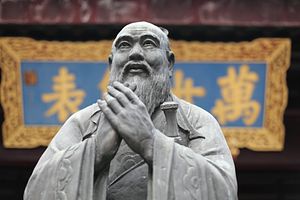The phenomenal rise of Donald Trump has alarmed many observers over the revival of anti-intellectualism in American society.
But America is not the only country that is being afflicted by anti-intellectualism. Across the Pacific, China is also witnessing a new wave of anti-intellectualism that is unprecedented in its scope and intensity.
So what is anti-intellectualism? The late American historian Richard Hofstadter was credited with popularizing the concept through his immensely influential book, Anti-intellectualism in American Life. Intellect, according him, “examines, ponders, wonders, theorizes, criticizes, imagines.” It is “the critical, creative, and contemplative side of mind.”
An intellectual, then, is a person who demonstrates these traits of mind. Anti-intellectualism, wrote Hofstadter, is “resentment and suspicion of the life of the mind and of those who are considered to represent it; and a disposition constantly to minimize the value of that life.”
For Hofstadter, anti-intellectualism is a state of mind; it is not—due to First Amendment protection—political persecution of intellectuals (the McCarthy era that was the focus of his analysis is an exception that proves the rule). Now, as then, a significant number of Americans—both ordinary citizens and political elites—seem inclined to substitute their beliefs (religious or secular) for truths. They choose to be uninformed and uncritical; they reject facts in favor of opinions. As President Barack Obama lamented in a commencement speech at Rutgers University on May 15: “We assume whatever is on the web must be true. We search for sites that just reinforce our own predispositions. Opinions masquerade as facts. The wildest conspiracy theories are taken for gospel.”
The debate on American anti-intellectualism can also help illuminate Chinese anti-intellectualism, which has a much longer history and is much more complicated than its American counterpart. Many, if not most, of the Chinese intelligentsia are, in fact, anti-intellectualist, according to Hofstadter’s definition.
China is the land of Confucianism. For more than a thousand years, the teachings of Confucius and his successors constituted the unchallenged ideology of the Middle Kingdom. A cornerstone of Confucianism is the elevated status of the scholar (读书人), a term that is used interchangeably with 知识分子 (intellectual) in Chinese popular and elite discourse. Two popular sayings aptly summarize the prominence of intellectuals in Chinese socio-political life. The first is 万般皆下品,惟有读书高 (To be a scholar is to be at the top of the society), the second is 学而优则仕 (Officialdom is the natural outlet for good scholars). Thus the scholar-official, who is recruited into civil service through a series of scholarly exams, has been the defining icon of the ancient Chinese bureaucratic state.
Paradoxically, the same Confucianism that exalts intellectuals also actively encourages anti-intellectualism. A social order based on strict hierarchy, which is another cornerstone of Confucianism, mandates unconditional deference to authority, governmental or scholarly. Hence conventional Chinese pedagogy emphasizes rote learning, rather than classroom debate or critical thinking. Students are supposed to respect, not to challenge, a teacher’s authority. By the same token, a junior scholar/official is supposed to feign respect and admiration in front of a senior scholar/official, regardless of the latter’s intellectual merits or policy competence. The Chinese intellectual, in a sense, is born into a long tradition of anti-intellectualism.
One consequence of Chinese anti-intellectualism is that social sciences as understood and practiced in the West have never flourished in China. Seldom does a Chinese intellectual “examine, ponder, wonder, theorize, criticize, or imagine”—the essence of social science research—because such intellectual pursuits carry the risk of offending governmental/scholarly authorities. Thus arts and humanities—particularly literature and textual criticism—have been the favorites of Chinese intellectuals, because these subjects, as understood by many Chinese, not only seem to require the least exercise of critical intellect, but also offer a spiritual escape for those who are unwilling to join in the chorus of anti-intellectualism.
Confucianism is no longer the ruling ideology of China, but anti-intellectualism remains a potent force in Chinese life. To be an intellectual is to be “critical, creative, and contemplative,” yet an increasing number of contemporary Chinese intellectuals seem to have given up on the life of the mind. Instead they indulge themselves in the exact opposite of intellect: being uncritical, uncreative, and unreflective. They have degenerated, as one Chinese commentator put it, into “pseudo-intellectuals” characterized by bureaucratization, factionalism, money worship, and plagiarism.
Unsurprisingly, social science research by many Chinese scholars—both ancient and contemporary—tends to be descriptive and repetitive, lacking in analytical depth, theoretical innovation, methodological rigor, and critical engagement with existing literature. Small wonder that a Chinese school of international relations—to take one notable example—is conspicuous by its absence.
Another manifestation of anti-intellectualism is the growing appeal of officialdom to a large number of Chinese intellectuals. There is nothing wrong for intellectuals to serve in government; but against the backdrop of Confucian prescription for deference to authority, a Chinese intellectual in government is more likely to justify and defend government policies than to criticize them. To be critical is not the same as being anti-government, but in the long shadow of Confucianism, the two are usually conflated. To be critical is to be politically incorrect and—by extension—punishable. More importantly, once political power and the privileges that comes with that power become an end in and of itself, an intellectual is no different from a politician.
Thanks to Donald Trump, both American and Chinese observers are reflecting upon anti-intellectualism in their own country. Hopefully such reflections will lead to a renewed appreciation of the value of intellect, and all the good things that come with the exercise of intellect.

































